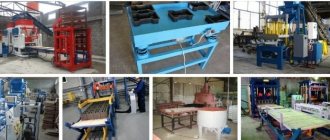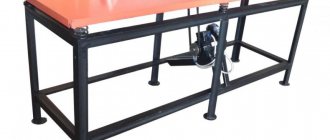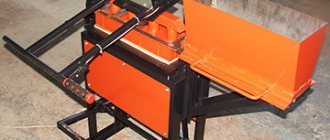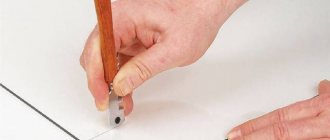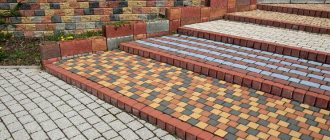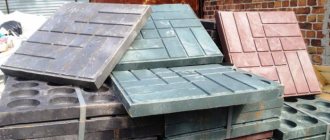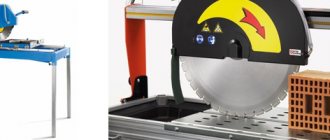Among the newest building materials that have recently appeared on the Russian market, rubber tiles can be distinguished. Although this is a rare, but quite promising product. In this article we will look at the technology of its production and the equipment that will be needed for the production of rubber tiles.
Rubber paving slabs
To understand what material an entrepreneur will be dealing with, let's look at several of its characteristics. Firstly, the service life that manufacturers promise is on average 20 years. Secondly, this coating has anti-slip properties, which expands the possibilities of its application. Thirdly, the rubber tile has sufficient elasticity to prevent the formation of an ice crust on it.
How much money do you need to start a business?
Starting investments are from 2 million rubles, this is how much the equipment, its delivery and setup will cost. Rented premises will cost 30 thousand rubles. per month. Remuneration for workers in 2 shifts - 170 thousand rubles. in 22 working days.
Costs of consumables.
For 1 sq.m. rubber tiles 40 cm thick and 50 by 50 cm in size. Rubber crumbs - 25-26 kg, coloring pigment - 350 grams, glue (polyurethane) - 2.45 kg. Price for 1 kg: glue - about 148-150 rubles, crumbs - 15 rubles, and pigment - 80 rubles. As a result, the cost of consumables is about 780 rubles. Plus manufacturing costs - approximately 120 rubles. Therefore, the cost of producing 1 sq.m. tiles will cost nine hundred rubles.
Stages of business organization
The creation of any enterprise, regardless of the direction of activity, begins with the development of a business plan. It is necessary to analyze the demand for rubber tiles in your region and the offers of competitors, calculate the volume of planned production and sales plan. The advantage of the rubber tile production business is that competition in this market segment is still small. Therefore, an entrepreneur has a chance to occupy a niche, at least in his city or region.
Enterprise registration
The choice of organizational form of an enterprise for the production of rubber tiles is not particularly important. You can register an LLC, or you can. Each option has advantages and disadvantages, and the period for registration and registration with the Federal Tax Service in both cases will be no more than 5 days (provided that the documents are well prepared).
- An individual enterprise (IP) is easier to register because fewer documents are required. It is not necessary to keep accounting records; the Book of Income and Expenses is used to calculate the tax base. There is no need to set a cash limit; money can be taken from the cash register for personal needs. However, the individual entrepreneur is liable for his debts with all his property.
- A company (LLC) is more profitable in that it pays off debts only with the property of the enterprise. Registration is more complicated: you need to prepare a Charter (or take a standard one from the Federal Tax Service website), minutes of the meeting on its creation (decision of the sole founder) and other documents. This option is preferable if several participants invest money in the business.
Activity codes for the production of rubber tiles and coatings are selected from the reference book “OK 029-2014 (KDEC Rev. 2)”. Section 22 includes production:
- 22.19 - other products made of natural and synthetic rubber, includes rubber materials for repair;
- 22.19.1 - regenerated rubber in the form of plates, sheets, tapes;
- 22.19.2 - rubber mixtures and products made from them.
As for the choice of taxation system for the production of rubber tiles, the simplified tax system (simplified system) is most profitable. An application for transition from the general system to the simplified one must be submitted to the Federal Tax Service before December 31 of the year in which the enterprise is registered. “Simplified” significantly reduces the tax burden and simplifies the submission of reports to the tax office.
Selection of premises
To accommodate production equipment, a warehouse for raw materials and finished products, you need to purchase or rent a premises of about 100 m2. The production facility must be heated; to work with polymer glue, the temperature inside it must not be lower than 5 ⁰C. Storage areas can be cold. The approximate ratio of workshop area/tile productivity per shift is maintained:
- 30–50 m2 - about 20 sq. m;
- from 60 m2 - about 40 sq. m;
- from 100 m2 - about 60 sq. m.
Example of financial calculation
Let us give an example of the production of rubber paving slabs in a rented premises of 100 square meters. m. The cost of the production line was 1,700,000 rubles. Single shift work, 3 workers (including the foreman), 22 working days. Produced 60 sq. m of rubber tiles per shift.
Expenses
- For raw materials (tiles 40 mm thick, density 840 kg/m3) they are only 869 rubles/1 sq. m of products: crumbs: 25.5 × 16 rub. = 408 rub.
- polyurethane glue: 2.4 × 220 = 428 rub.
- coloring pigment: 0.35 × 95 = 33.5 rub.
In total, the main total production costs are:
1,147,080 + 4,500 + 150,000 + 20,000 = 1,321,580 rubles/month.
1320 sq.m. are produced per month. m of rubber tiles measuring 500*500 mm. Its average market price is 1,800 rubles per sq.m. Revenue - about 1,755,600 rubles. when selling 70% of the products produced. Traditionally, more construction materials are purchased in summer and less in winter. Profit - 434,020 rubles/month. The payback period for investments is about 4 months. Numerous examples show that the level of investment in business averages 1.75–2 million rubles.
Sales areas
- Construction contracting organizations (infrastructure development in residential areas, public places).
- Management companies, housing and communal services organizations (improvement, territory repair).
- Private individuals (improvement of country houses, dachas, swimming pools).
- Landscape design organizations (execution of custom design projects).
- Sports institutions, complexes engaged in the repair and arrangement of sports facilities and grounds.
What equipment is needed for tile production?
To open a workshop you will need the following equipment:
- mixers or raw mixers (at least 2 pieces);
- volcanic press;
- pressing molds;
- drying chamber.
Rubber crumbs and other components of the working mixture are loaded into the mixer. This equipment has low-speed blades that can thoroughly mix everything. Typically, the glue and solid components of the crumb are mixed separately, which is why at least two pieces of equipment are needed.
Hot pressing equipment
Press molds must be placed on molding tables. There they are filled with a mixture for rubber tiles. The molds are then placed in special carts and placed under pressure. After this, the carts are moved to the drying chamber. The temperature is low, only 60 degrees, but high humidity is maintained to provide a sauna effect. Under such conditions, chemical processes occur that ensure a tight connection of particles of crumbs, glue and coloring matter. The crumb increases in volume, voids appear, which are completely filled with the binder composition.
Cold pressing
The productivity of the entire production line is determined precisely by the dimensions of the drying chamber. Its minimum volume, which ensures profitable production, is 200 sq.m. Depending on the size, other equipment is selected - carts and molds.
Tips for beginners
Before starting your own business, you should collect all the necessary documents and obtain a certificate for your products. It is also recommended to find a trusted supplier of equipment and raw materials in advance. In this case, you can hope for warranty service for the equipment, which will avoid long downtime. It is necessary to outline in advance possible markets for the finished material. You should also rent a territory of sufficient area for production and storage of products. After this, you can start purchasing equipment and raw materials, finding personnel and starting work.
Raw materials and technology for the production of rubber paving slabs
The raw materials used are another advantage of the rubber tile production technology. Crushed rubber is used as it - the result of recycling car tires. The material of tires has all the advantages that should be inherent in paving slabs:
- Wear resistance and strength;
- Elasticity and at the same time the ability to maintain shape;
- Resistant to alkaline and acidic environments.
Like any secondary raw material, the cost of crumb rubber is very affordable. 1 kg of material does not exceed 30 rubles. The price of crumbs may be lower, it depends on the processing technology, size and color.
The production of tiles from rubber crumbs can be established in two ways: hot and cold pressing. The equipment for them is largely similar. The first method is not widely used, as it has a number of side effects. With the increase in production efficiency, the quality of products began to deteriorate noticeably: wear resistance decreased, and an unpleasant odor appeared in the finished product. The cold pressing method of crumb rubber does not produce such side effects. The technology consists of the following stages: mixing raw materials, pressing at normal ambient temperature, drying in special chambers for 4-6 hours.
Features and Benefits
This relatively new material is rapidly gaining high positions among the variety of different types of coatings, both in cities and in suburban areas. Rubber tiles are made from waste obtained during the mechanical destruction of tires, the problem of disposal of which is acute in Russia.
Tire crumbs retain all the original qualities of rubber: molecular structure and elastomeric properties. This allows it to be successfully used for the production of a large number of useful products, among which this tile has become the most popular.
Its useful consumer qualities:
- durability - service life is up to 15 years;
- anti-slip effect - protects against accidental injuries;
- aesthetics - it is possible to add color pigments;
- frost resistance - does not crumble even in 40-degree frosts;
- biostability - not destroyed by fungus, does not mold;
- strength - the ability to withstand high loads.
Rubber tiles have so many advantages that the growing popularity of this building material does not surprise anyone. The only drawback is the relatively high cost compared to concrete and other types of covering paths and areas.
Currently, in our country only about 20% of used tires are processed into crumbs. Every year the number of plants for their recycling increases, therefore, raw materials will become cheaper. This industry is only at the beginning of its development, and, accordingly, the production of rubber tiles and coatings is not only profitable, but also a very promising business.
Production Features
The production of multi-colored and black paving slabs from rubber crumbs has different costs. When dyes are added to the composition, the amount of adhesive solution increases significantly, so colored products are more expensive. The selling price of rubber paving slabs also depends on the cost of raw materials. Large chips, as a rule, cost less, but they are less easy to paint. In order to minimize costs, the production of rubber paving tiles was established using a two-layer technology. The lower part is a layer of a larger fraction of raw materials, and the upper part is made of fine crumbs, which are easier to paint and apply designs.
0
Analysis of market conditions in your region
To open your own production, you need to analyze the current market conditions in your region. This will allow you to design a profitable business development option. The research takes place in several stages:
- Information about competitors, pricing, and target audience is collected.
- The received data is systematized.
- The interrelationships of situation-forming factors are revealed.
- After completing the analysis of market conditions, they move on to drawing up a production plan.
Market analysis is an important stage that cannot be ignored.
Sales market
At the initial stage, it is very important to find sales markets in order to provide the company with constant orders. such customers among the following clients:
- construction companies that maintain housing stock;
- companies responsible for the improvement of parks and recreation areas;
- HOA;
- management companies;
- administrations of cities and districts;
- companies involved in the sale and installation of playgrounds;
- companies responsible for installing outdoor sports equipment;
- landscape designers.
You can identify a circle of clients and send them commercial offers or leave requests on wholesale trading platforms. This way you can reach customers from other regions. After contacting managers of construction companies, they usually practice “cold calls”, in which they describe the benefits of cooperation with you and offer to hold a meeting/conclude a contract.
Technical equipment
Do-it-yourself rubber tiles can only be made if you have the appropriate equipment, which has a very impressive cost. If you intend to engage in manufacturing for running a business, then purchasing it is advisable, whereas if you are faced with the task of laying a path on a personal plot, then it is preferable to purchase the products ready-made; it will be cheaper even than the option in which the installations are rented.
To carry out work on the production of rubber tiles you should buy:
- heating cabinet;
- mixer;
- hole jig;
- Hydraulic Press;
- set of forms;
- platform, tables and stands for the mixer.
If you plan to purchase such equipment, then you will have to pay approximately 1,590,000-2,370,000 rubles. In the minimum price option you will receive the most modest set of equipment, while the highest price includes a mini-factory.
Room
It is better to select premises for production in the industrial zone of the locality. Rental prices in the industrial zone are lower than in other parts of the city. In addition, the absence of residential buildings nearby will help you avoid conflicts with the population due to not very pleasant production odors.
The area of the premises will, first of all, be determined by the planned scale of future production. For a small workshop, 100-120 square meters will be enough. Ceilings must be at least 3 meters high.
Naturally, the room must be heated. In addition, the workshop must have water and sewerage. The voltage supplied in the workshop should be 380 V.
It is necessary to provide space for a warehouse of finished products and for storing raw materials. Changing rooms for staff and a toilet are also required.
Entrances to the premises should be convenient. Convenient transportation for such production is an urgent need. You will need to export finished products by freight transport and import raw materials.
Supplier search
You can buy old car tires from the public or from auto repair shops and process them into crumb rubber yourself. But this is a very labor-intensive and costly process. It’s easier to immediately find suppliers of crumb rubber. The price depends on the following factors:
- quality of raw materials;
- shade;
- size of rubber fractions.
It makes sense to contact the owners of processing plants in your area that work with rubber products.
Compound
As already mentioned, the main component of rubber tiles is rubber crumbs. The main advantages of such raw materials include the following factors:
- wear resistance;
- resistance to negative environmental factors;
- hygiene;
- does not change color from sunlight;
- ease of installation - installation can be done by yourself;
- used for flooring in both residential and industrial premises.
Such products can be safely used even in chemical production - the tiles do not deteriorate when exposed to aggressive chemicals.
In addition, rubber tiles are an ideal covering for sports and children's playgrounds. There will be no ice or puddles on this surface.
Tile molds
You can make molds for rubber tiles yourself. But this activity will take a lot of your time and money, so it is better to purchase ready-made products or order their production according to a sketch.
Before use, do not forget to treat the mold with soapy water or silicone so that the solution does not stick to it. Non-metallic molds, after removing the finished rubber, are treated with an acid solution to eliminate dust.


